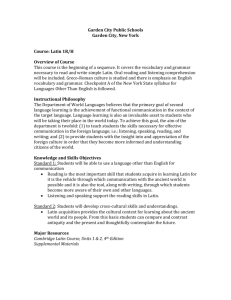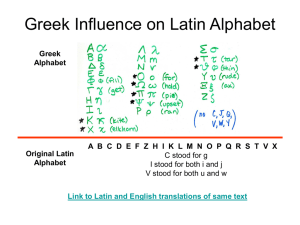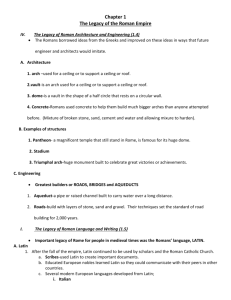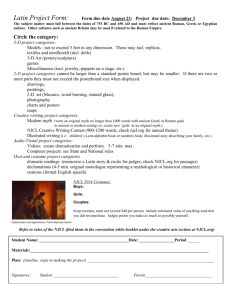Syllabus Latin I
advertisement
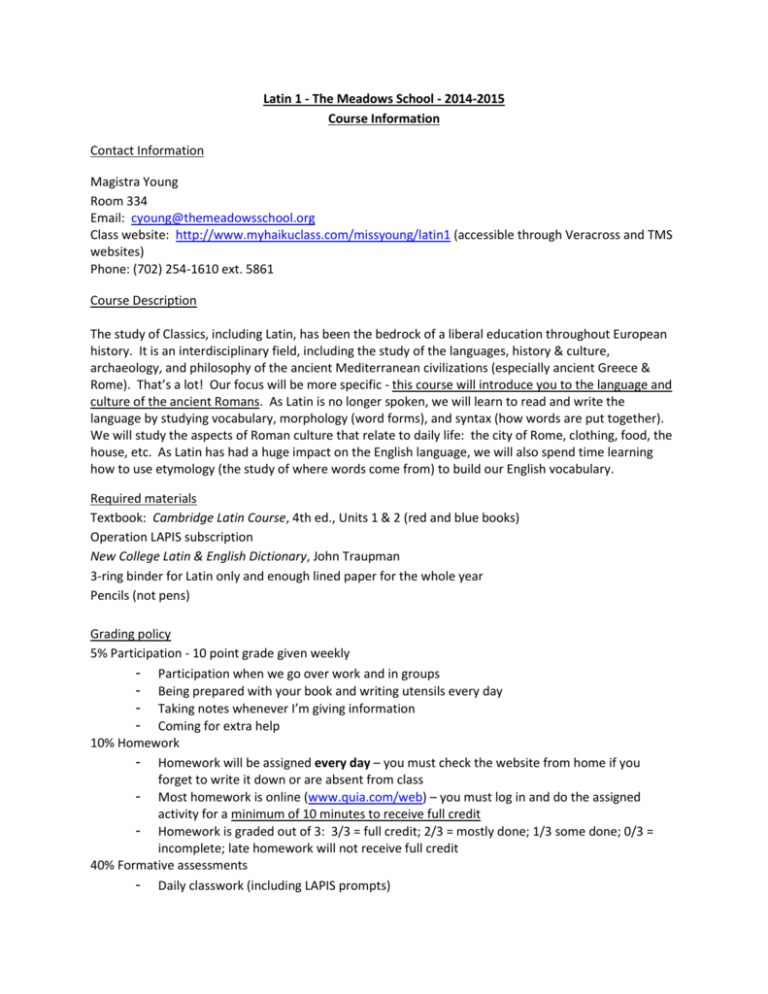
Latin 1 - The Meadows School - 2014-2015 Course Information Contact Information Magistra Young Room 334 Email: cyoung@themeadowsschool.org Class website: http://www.myhaikuclass.com/missyoung/latin1 (accessible through Veracross and TMS websites) Phone: (702) 254-1610 ext. 5861 Course Description The study of Classics, including Latin, has been the bedrock of a liberal education throughout European history. It is an interdisciplinary field, including the study of the languages, history & culture, archaeology, and philosophy of the ancient Mediterranean civilizations (especially ancient Greece & Rome). That’s a lot! Our focus will be more specific - this course will introduce you to the language and culture of the ancient Romans. As Latin is no longer spoken, we will learn to read and write the language by studying vocabulary, morphology (word forms), and syntax (how words are put together). We will study the aspects of Roman culture that relate to daily life: the city of Rome, clothing, food, the house, etc. As Latin has had a huge impact on the English language, we will also spend time learning how to use etymology (the study of where words come from) to build our English vocabulary. Required materials Textbook: Cambridge Latin Course, 4th ed., Units 1 & 2 (red and blue books) Operation LAPIS subscription New College Latin & English Dictionary, John Traupman 3-ring binder for Latin only and enough lined paper for the whole year Pencils (not pens) Grading policy 5% Participation - 10 point grade given weekly - Participation when we go over work and in groups - Being prepared with your book and writing utensils every day - Taking notes whenever I’m giving information - Coming for extra help 10% Homework - Homework will be assigned every day – you must check the website from home if you forget to write it down or are absent from class - Most homework is online (www.quia.com/web) – you must log in and do the assigned activity for a minimum of 10 minutes to receive full credit - Homework is graded out of 3: 3/3 = full credit; 2/3 = mostly done; 1/3 some done; 0/3 = incomplete; late homework will not receive full credit 40% Formative assessments - Daily classwork (including LAPIS prompts) - Translations from Latin to English: one of our main class activities and all graded according to the same rubric (you’ll get this later) - Quizzes: check-ups on your understanding. Some will be unannounced! - Memorization quizzes can and must be retaken until you receive a passing grade 45% Summative assessments - Tests are all cumulative and focus on assessment of your overall reading comprehension in Latin - Tests cannot be retaken Semester grade: Quarters 1 & 2 - 40% each; midterm exam - 20% Final grade: Quarters 1, 2, 3, 4 - 20% each; midterm & final exams - 10% each Expectations - - - - Absences: If you are absent, you must go to the class website to find out what you missed and download notes/worksheets – there isn’t time in class for me to tell you about everything we did. You must complete homework on time if you are absent but not sick. If you're sick, you have 1 day for every day you missed to make up homework and 3 days for quizzes. o If you miss an appointment to make up a quiz or test, you will get a zero. Don’t get behind: if you don’t understand something, come for extra help before it’s too late and you get behind. Extra help (15-30 minute session in ROOM 334) is available to review homework, prepare for quizzes, or answer any questions – see me anytime and earn class participation for your extra time & effort Academic honesty: don’t copy from other students or from the internet, and don’t cheat on quizzes/tests – you won’t get away with it and it’s not right. Just come to me and explain if you need extra time to complete something, need to do a retake, or are having trouble. I understand!!! Technology: we will be completing Operation LAPIS activities in class, so you will need a laptop or iPad everyday. You also might find useful the following iPhone apps: SPQR, Latin +, WORDS, or Latin Dictionary by davidfinucane.com National Latin Honor Society: Students of all levels are eligible to join the National Latin Honor Society if they meet these benchmarks: 1. 90%+ grade average 1st, 2nd, and 3rd quarter 2. Meaningful participation in at least 2 JCL events (certamen, conventions, etc.) 3. 8 hrs minimum served in JCL service projects Syllabus Latin 1 will cover topics from Missions 1-10 of Operation Lapis and Units 1-20 of the Cambridge Latin Course. Language courses are cumulative and previous material will be continually reassessed. August 25-30 September 2-19 September 22October 10 October 13-30 November 3-26 December 8-12 December 15-19 January 5-23 Introduction to Latin & Ancient Rome MISSION 1: (CLC Stages 1-2) Grammatical Learning Objectives: Nominative singular; Accusative singular; 3rd person singular present tense; Introduction to Latin word order Cultural/Historical Learning Objectives: Analyze Roman naming conventions and construct Roman greetings; Analyze and evaluate Lucius Caecilius Iucundus; Examine the lay-out of the Roman house; Design a route around the major neighborhoods of Pompeii; Identify, describe, and use customs of Roman dining September 19 - Test Stages 1-2 MISSION 2: (CLC Stages 3-4) Grammatical Learning Objectives: Prepositional phrases; Introduction to declension; 1st and 2nd person singular present tense; Personal pronouns Cultural/Historical Learning Objectives: Navigate through a Roman house; Evaluate the significance of Roman Literature and patronage; Summarize and describe the Titanomachy October 10 - Test Stages 3-4 MISSION 3: (CLC Stages 5-6) Grammatical Learning Objectives: Nominative plural; 3rd person plural present tense; 3rd person singular and plural imperfect tense; 3rd person singular and plural perfect tense; Imperfect tense of sum, esse Cultural/Historical Learning Objectives: Characterize early imperial Rome and her customs, as well as differing viewpoints on the empire; Evaluate early myths about the Trojans, e.g. Laomedon and Hercules; Design routes around Pompeii and navigate through the Forum; Summarize and use knowledge about the Forum and merchants to interact with them October 30 - Test Stages 5-6 MISSION 4: (CLC Stages 7-8) Grammatical Learning Objectives: Uses of the imperfect tense; Principal parts for perfect stem; Accusative plural; Superlative adjectives Cultural/Historical Learning Objectives: Summarize and describe the Trojan War; Discuss how the Trojan War carries over into Roman identity; Evaluate the contributions to Roman literature by Vergil, Horace, and Cicero; Discuss these contributions and their significance to Roman identity November 22 - Test Stages 7-8 Review & Begin Mission 5 Midterm Exams MISSION 5: (CLC Stages 9-10) Grammatical Learning Objectives: Dative singular and the indirect object; Personal pronouns in the dative; Comparative adjectives Cultural/Historical Learning Objectives: Design a route around Herculaneum; Evaluate significance of Herculaneum and its fate; Describe and use knowledge of reading scrolls; Summarize and describe January 26-February 13 February 17-March 6 March 9-27 April 6-24 May 4-20 May 21-29 June 1-5 the region of Campania January 23 - Test Stages 9-10 MISSION 6: (CLC Stages 11-12) Grammatical Learning Objectives: Dative plural; Imperfect tense: all persons; Perfect tense: all persons Cultural/Historical Learning Objectives: Analyze the formation and viewpoints of the Optimates and Populares; Evaluate the significance of Aeneas and his journey, as well as his contribution to Roman identity; Summarize, describe, and use Roman occupations; Analyze destruction of Pompeii, and the significance of Pliny the Elder and Pliny the Younger February 13 - Test Stages 11-12 MISSION 7: (CLC Stages 13-14) Grammatical Learning Objectives: Present infinitive; volō, nolō, possum in the present tense; Enclitic -que Cultural/Historical Learning Objectives: Summarize, describe, and use customs of Roman Slavery; Summarize and describe Roman Britain; Evaluate accounts regarding founding of Rome and discuss significance to Roman identity; Discuss importance of Livy to Roman history, including how myth gets incorporated into history March 6 - Test Stages 13-14 MISSION 8: (CLC Stages 15-16) Grammatical Learning Objectives: Adjective agreement; Ablative singular and plural; Imperfect of possum Cultural/Historical Learning Objectives: Evaluate the significance of Plato; Summarize Plato's Cave; Discuss significance of the Classical tradition in the modern world March 27 - Test Stages 15-16 MISSION 9: (CLC Stages 17-18) Grammatical Learning Objectives: Gender; Relative pronoun and relative clauses; Neuter nouns Cultural/Historical Learning Objectives: Discuss significance of Roman Britain, including political climate and client kings; Summarize and describe the end of the Monarchy and the beginning of the Republic, including Lucretia and Brutus April 24 - Test Stages 17-18 MISSION 10: (CLC Stages 19-20) Grammatical Learning Objectives: Pluperfect tense, all persons; Enclitic – ne; Words indicating questions; sum, esse, fuī - present, imperfect,perfect, and pluperfect, all persons Cultural/Historical Learning Objectives: Describe significance of literature, such as Horace's Odes and Vergil's Aeneid to Roman identity; Compare such literature to predecessors like Homer's Odyssey; Discuss significance of libraries in the ancient world; Explore points of view and conflicts between Optimates and Populares May 20 - Test Stages 19-20 Review Final Exams Technology goals While completing Operation LAPIS, students will demonstrate competence in the Technology Curriculum items 1.1, 1.3, 1.4, 1.7, 2.2, 2.3, 4.2, 4.5, 5.2, 5.6, and 6.2 by taking part in an online role-playing community designed to help students connect their growing ability to read Latin and their understanding of Roman culture to real-world and historical situations Occasional research and/or presentation assignments related to Roman culture will be assigned periodically and will address Technology Curriculum items 1.1, 1.2, 1.5, 1.6, 2.1, 3.3.


